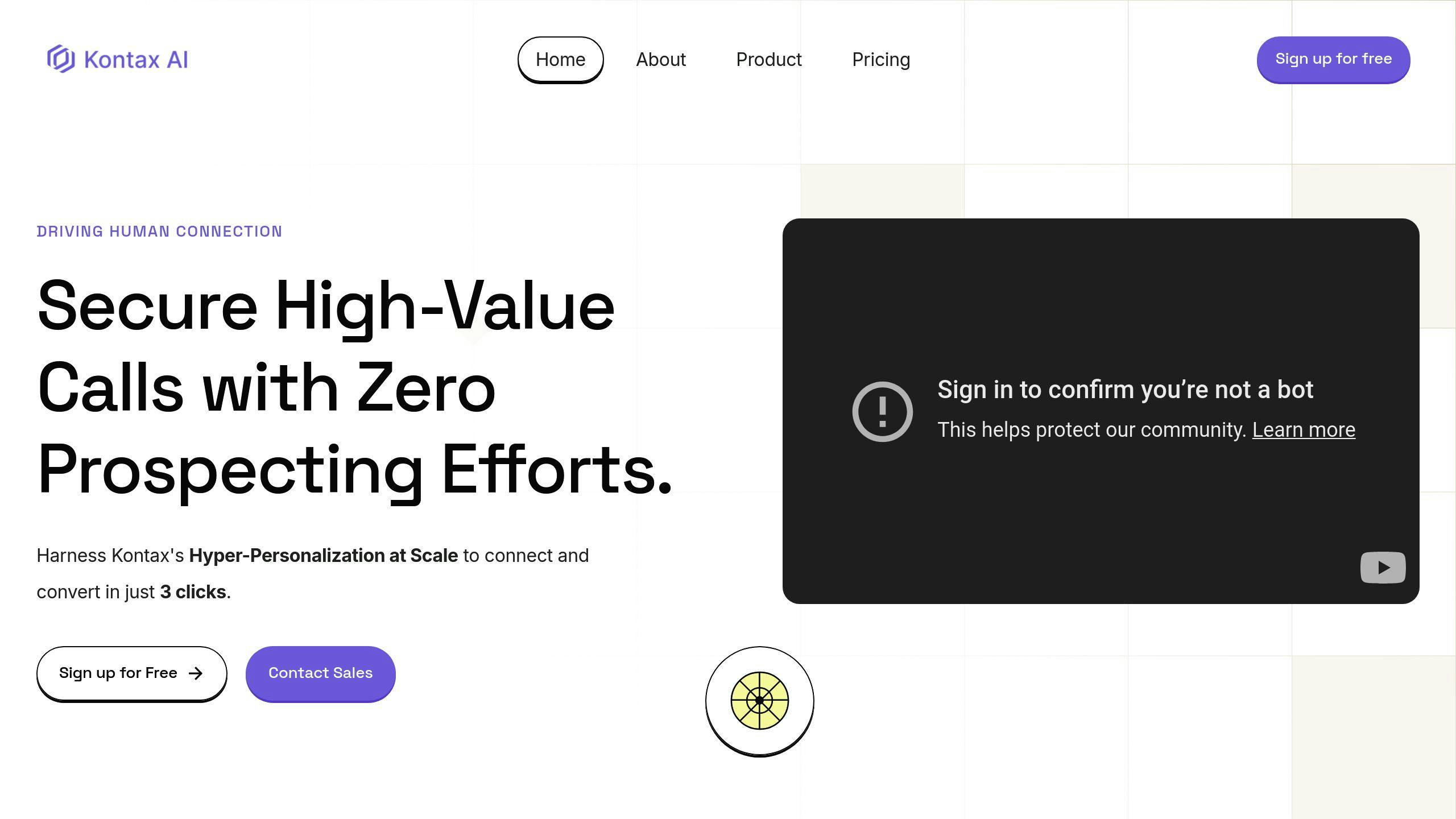Back to Page
Explore how AI tools streamline sales objection handling, saving time and enhancing customer interactions for better results.
AI Prospecting
Sales Prospecting
January 3, 2025

Omer Hochman
Sales Outreach
Common Sales Objections: AI Solutions for Better Handling
Sales objections like "It's too expensive" or "Not a priority now" can slow down deals. Using AI tools can save sales teams 34% of their time by automating responses, predicting concerns, and improving customer interactions.
Key Insights:
Common Objections: Budget, trust, urgency, authority, and product complexity.
How AI Helps:
Predictive Analytics: Spots objections before they arise.
Chatbots: Provides instant, 24/7 responses.
Natural Language Processing (NLP): Personalizes replies based on buyer sentiment.
Real-Time Coaching: Guides sales reps during live calls.
Results: Tools like Kontax AI ($20 per profile annually) have boosted reply rates by 300% and increased revenue by 20%.
Quick Comparison of AI Features:
AI doesn’t replace human interaction - it enhances it. By combining AI insights with personal connections, sales teams can close deals faster and build trust.
How To Handle Sales Objections Using Humantic AI
Common Sales Objections Explained
Sales teams often face objections that can disrupt their efforts and lower success rates. Knowing these challenges and their effects is key to crafting better AI-driven solutions.
Key Sales Objections and Their Effects
Sales objections usually fall into specific categories, each with a direct impact on conversion rates and the overall sales process. Here's a breakdown:
Challenges of Manual Objection Handling
Traditional methods for managing objections come with several issues that can hurt sales performance.
"Voice AI ensures consistent messaging and reduces human error." - Dasha AI [2]
Some of the main problems with manual objection handling include:
Inconsistent responses: These can undermine credibility and trust with potential customers.
Slow processes: Manual handling struggles to keep up in high-volume sales environments, often causing a loss of momentum.
Lack of trend analysis: Spotting patterns across sales conversations is difficult without proper tools.
AI addresses these problems by delivering scalable, real-time, and consistent solutions, making objection handling faster and more data-driven. This shift highlights the growing importance of AI tools in modern sales strategies.
AI Tools for Improved Objection Handling
AI technologies are reshaping how sales teams handle objections, turning traditional methods into more precise, measurable processes. These tools not only streamline responses but also improve how teams engage with prospects.
Chatbots for Instant Responses
AI chatbots are often the first point of contact for addressing common sales objections. They provide quick, automated responses, especially during key decision-making moments.
Here’s what chatbots bring to the table:
Predictive Analytics for Proactive Solutions
While chatbots handle immediate concerns, predictive analytics empowers teams to foresee potential objections. By automating repetitive tasks, this technology frees up time for more personalized interactions.
"The key benefits include the ability to anticipate objections before they arise, understand the 'why' behind objections, standardize and optimize objection handling, and empower reps with data-driven insights." [1]
Personalizing Responses with NLP
Natural Language Processing (NLP) takes personalization to the next level by crafting responses that align with buyer sentiment and intent. Kontax AI, for instance, offers an AI Objection Handling feature at $20 per profile annually. It:
Analyzes buyer sentiment to create tailored responses
Suggests replies based on the context of the conversation
Adjusts communication style to align with buyer profiles
Clients using Kontax AI have reported reply rates tripling thanks to these personalized, AI-driven interactions.
Together, these AI tools create a well-rounded system for tackling objections effectively, giving sales teams the resources they need to engage prospects more meaningfully.
Examples of AI-Driven Objection Handling
Kontax AI's Impact on Sales Teams

Kontax AI's platform has shown clear benefits for businesses, helping sales teams handle objections more effectively through data insights and automation. Its AI Objection Handling feature (priced at $20 per profile annually) has contributed to a 300% boost in reply rates, 34% quicker lead qualification, and 20% revenue growth in just three months. By combining personalized messaging with automated lead qualification, the platform adjusts to prospect responses in real-time, streamlining the sales process.
How AI Techniques Are Applied
While Kontax AI excels in predictive objection handling, Glyphic AI takes it a step further with real-time analysis and continuous learning. Here’s how it works:
Real-Time Analysis: The AI evaluates tone and sentiment during calls, offering instant feedback to help sales reps address objections immediately.
Automated Learning System: By analyzing data from all sales conversations, the platform helps businesses refine their messaging and improve their approach over time.
Strategic Integration: Teams can use Glyphic AI to:
Identify objection trends across customer groups
Craft responses based on data insights
Measure how effective their objection-handling strategies are
Spend more time building relationships while automating repetitive tasks
Integrating AI into Sales Workflows
Combining AI with Existing Sales Tools
AI platforms work seamlessly with CRM systems and sales tools, making objection handling more efficient by syncing data across platforms. For example, Kontax AI's platform simplifies this process by automatically updating CRM records with AI-analyzed objection patterns. This reduces the time sales teams spend on manual data entry and tracking by 34%.
The goal is to automate repetitive tasks while ensuring that complex objections are flagged for human attention. This approach helps sales teams maintain efficiency without losing the personal touch. Key benefits of this integration include:
Using AI to spot objection trends and offer actionable insights.
Automating routine responses while keeping human reps involved for nuanced cases.
Providing data-driven recommendations to improve strategies.
Selecting the Right AI Tool
Choosing the right AI solution for objection handling requires careful evaluation to match your business needs. Here’s a breakdown of key factors to consider:
When implementing AI tools, look for solutions that offer thorough training and clear implementation guidelines. The most effective tools should deliver:
Clear improvements in sales performance.
Easy integration with your existing processes.
Flexibility to adapt to changing sales strategies.
Strong data protection measures.
Pricing options that grow with your team and campaigns.
Conclusion: AI's Potential in Sales
Main Points
AI is changing the way sales teams tackle objections, boosting both efficiency and effectiveness. With AI-powered tools, teams save time on repetitive tasks, allowing sales reps to focus on building stronger customer connections and closing deals.
Here’s how AI is improving objection handling:
Anticipating objections: Predicting common concerns before they arise.
Real-time optimization: Processing conversations instantly to refine responses.
Data-driven strategies: Analyzing patterns to guide decision-making.
Consistency across teams: Standardizing objection handling for scalable results.
AI's Future in Sales
AI’s role in sales is set to grow even further. Glyphic AI highlights this potential:
"AI can empower reps, equip leaders, and ultimately transform objections from dreaded hurdles into valuable opportunities for growth" [1]
This shift is already visible. AI analyzes thousands of sales calls to generate customized playbooks, while advancements in natural language processing improve understanding of customer sentiments and objections. These technologies are laying the groundwork for even smarter objection-handling tools.
In the future, AI will continue to refine sales processes by:
Crafting tailored responses: Using past interactions to personalize communication.
Providing real-time coaching: Offering on-the-spot guidance based on live and historical data.
Understanding customer concerns: Developing deeper insights into customer needs and challenges.
AI doesn’t replace human expertise - it enhances it. By blending human intuition with AI’s capabilities, sales teams can achieve stronger results while keeping customer relationships genuine. As AI evolves, it will unlock even more advanced tools that redefine success in sales.
FAQs
What is a common objection in sales and how should you handle it?
Sales objections often revolve around issues like budget, urgency, trust, or authority. AI tools have reshaped how sales teams address these hurdles, making the process smoother and more effective.
Here’s a quick look at how AI can help with common objections:
AI doesn’t replace traditional sales methods but enhances them by analyzing patterns, suggesting strategies, and automating repetitive tasks. For example, sentiment analysis can flag customer concerns early, while predictive analytics equips teams to handle objections proactively.
To make the most of AI in overcoming objections:
Listen carefully: Sentiment analysis tools can help you catch hesitation or doubt immediately.
Tailor your response: Use data insights to craft responses that resonate with the customer’s specific concerns.
Keep the conversation going: Automate follow-ups without losing the personal touch.
While AI is great for spotting trends and offering solutions, it’s the human connection that ultimately builds trust and closes deals. Combining AI with genuine, personal interactions makes for the best results.
Related Blog Posts
Stay up to date with the latest video business news, strategies, and insights
sent straight to your inbox!


